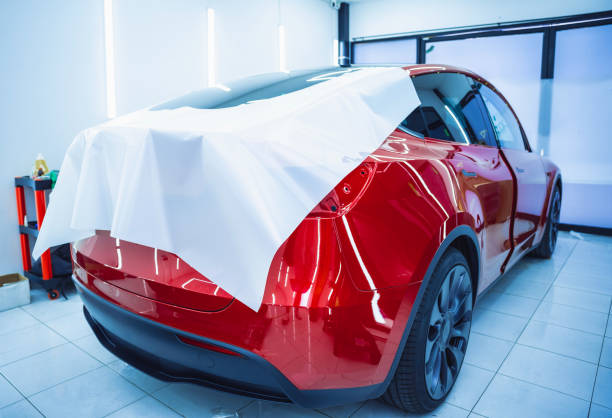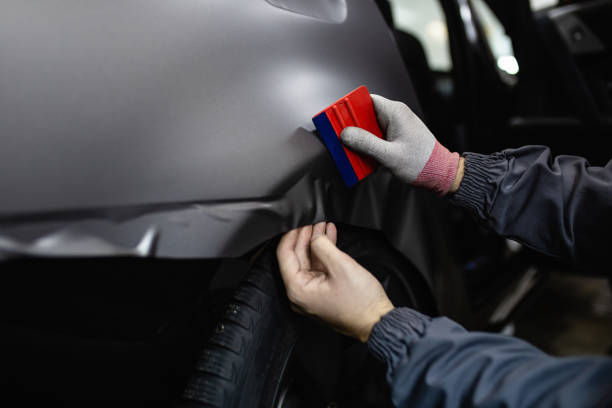Car wrapping has become a popular choice for vehicle customization, offering an attractive alternative to traditional paint jobs. Whether you’re looking to advertise your business or simply want to enhance your car’s aesthetic, understanding the cost to wrap a car is essential. This comprehensive guide dives deep into every aspect of car wrapping, from preparation to maintenance, helping you make informed decisions about your vehicle.
Understanding Car Wrapping
Car wrapping involves applying a large vinyl graphic or decal to a vehicle’s exterior. This process not only transforms the vehicle’s appearance but also provides protection for the underlying automotive paint. Vinyl wraps come in various finishes, including gloss vinyl, matte vinyl, satin vinyl, and specialty options like carbon fiber wraps and chrome wraps. The choice of finish can significantly impact both the look and cost of your wrap.
Benefits of Car Wrapping
- Cost-Effective Customization: Compared to a full paint job, wrapping is generally more affordable and offers a wide range of designs and colors.
- Protection: Vinyl wraps provide a layer of protection against UV rays, dirt, and minor scratches, preserving the original paint beneath.
- Ease of Removal: Unlike paint, vinyl wraps can be removed without damaging the vehicle’s surface, making them an excellent choice for temporary designs or branding.
- Advertising Potential: Businesses can utilize vehicle wraps as moving advertisements, increasing visibility and brand recognition.
Preparing a Vehicle for Vinyl Wrap
Before applying a vinyl wrap, proper preparation is crucial to ensure a smooth and successful application. Here are the essential steps involved in vehicle surface preparation:
- Cleaning the Surface: Thoroughly wash the vehicle to remove dirt, grease, and wax. A clean surface ensures better adhesion of the wrap.
- Repairing Scratches and Dents: Address any imperfections in the vehicle’s surface. Wraps can magnify flaws, so it’s best to repair them before installation.
- Vehicle Inspection: Conduct a detailed inspection to identify areas that may require special attention during the wrapping process.
Estimated Costs of Preparation
The preparation process can incur additional costs, which typically range from $100 to $300, depending on the vehicle’s condition and size. These costs may include:
| Preparation Step | Estimated Cost Range |
| Cleaning | $50 – $150 |
| Scratch/Dent Repair | $50 – $200 |
| Inspection and Assessment | $0 – $50 |
Car Wrapping Cost Overview

When discussing car wrapping costs, several factors come into play, including vehicle size, wrap material quality, design complexity, and geographical location. Understanding these factors can help you budget effectively.
Factors Influencing Cost
- Vehicle Size: Larger vehicles, such as SUVs and trucks, will naturally incur higher costs due to the increased amount of vinyl required.
- Wrap Material Quality: The type of vinyl used plays a significant role in the overall cost. Premium materials tend to have better durability and finish.
- Complexity of Design: Custom designs with intricate graphics or multiple colors will increase installation time and labor costs.
- Location and Market Demand: Prices can vary significantly based on local market rates and demand for professional car wrap services.
Detailed Cost Breakdown
Cost of Vinyl Material
The price of vinyl material is a primary component of the total cost to wrap a car. On average, vinyl costs between $2 and $5 per square foot. The total vinyl cost can be calculated based on the vehicle’s surface area. Here’s a quick breakdown of different vinyl options:
| Vinyl Type | Average Cost per Square Foot | Characteristics |
| Cast Vinyl | $3 – $5 | Durable, ideal for complex curves |
| Calendared Vinyl | $2 – $3 | Less expensive, suitable for flat surfaces |
| Specialty Vinyl | $5 – $10 | Unique finishes (chrome, carbon fiber) |
Labor Costs for Wrapping
Labor costs vary based on the wrap installation’s complexity and the technician’s expertise. On average, you can expect to pay between $50 and $150 per hour for professional installation. A standard vehicle wrap typically takes between 10 to 15 hours to complete, leading to total labor costs of $500 to $2,000.
Additional Costs
There are several additional costs associated with car wrapping, including:
- Design Fees: If you require custom designs, expect to pay an additional $100 to $500.
- Taxes and Fees: Depending on your location, local taxes can also impact the final price.
Total Cost Estimate
Combining all the elements, here’s a typical cost breakdown for wrapping a standard vehicle:
| Cost Component | Estimated Cost |
| Vinyl Material (200 sq ft) | $400 – $1,000 |
| Labor Costs | $500 – $2,000 |
| Preparation | $100 – $300 |
| Design Fees | $100 – $500 |
| Total Estimated Cost | $1,200 – $4,800 |
DIY Car Wrapping: Is It Worth It?
For the adventurous, a DIY car wrap might seem appealing. However, several factors should be considered before taking on this project.
Overview of the DIY Process
Wrapping a vehicle yourself requires patience, precision, and the right wrap application tools. Here’s a brief overview of the DIY process:
- Gathering Materials: Purchase high-quality vinyl, application tools, and cleaning supplies.
- Surface Preparation: Clean and inspect the vehicle thoroughly.
- Measuring and Cutting Vinyl: Measure each section of the vehicle accurately and cut the vinyl accordingly.
- Applying the Wrap: Use a heat gun to help mold the vinyl around curves and edges.
Cost of Materials for DIY
The cost of materials for a DIY car wrap typically ranges from $300 to $800, depending on the vinyl type and the size of your vehicle.
Pros and Cons of DIY Wrapping
Pros:
- Lower cost if done correctly
- Personal satisfaction from completing the project
Cons:
- Requires skill and experience
- Risk of errors leading to a subpar finish
- Potential damage to the vehicle’s paint
Common Mistakes to Avoid
- Not cleaning the vehicle properly
- Misaligning the vinyl during application
- Using low-quality materials
Professional Installation Costs
Choosing to hire professionals for car wrap installation comes with its own set of benefits. Professional installers bring experience, ensuring a high-quality finish that can enhance your vehicle’s appearance significantly.
What to Expect from Professional Services
When opting for professional installation, you can expect:
- High-Quality Materials: Professionals often use premium vinyl for better longevity.
- Expertise: Experienced installers know how to handle various vehicle shapes and designs.
- Warranty: Many professional services offer warranties for their work, providing peace of mind.
Average Costs of Professional Installation
Professional installation costs vary by vehicle type. Here’s a breakdown based on common body styles:
| Vehicle Type | Estimated Installation Cost |
| Sedan | $1,000 – $2,500 |
| SUV | $1,500 – $3,000 |
| Truck | $1,500 – $3,500 |
| Luxury Vehicles | $2,000 – $4,000 |
Warranty and Guarantee Considerations
Always ask about warranties before proceeding with professional installation. A good warranty can cover issues like peeling, fading, or bubbling, ensuring your investment is protected.
Cost of Wrap Removal
Over time, you may decide to remove or replace your vinyl wrap. Understanding the costs involved can help you budget accordingly.
When to Consider Removing a Wrap
- Damage: If the wrap is torn or discolored.
- Change in Aesthetic: Wanting a new look or design.
- Selling the Vehicle: Removing a wrap can enhance the vehicle’s resale value.
Average Costs Associated with Removal
The cost of vinyl wrap removal typically ranges from $150 to $600, depending on the vehicle’s size and the complexity of the removal process. Professional removal ensures that no damage is done to the underlying paint, which is crucial for maintaining resale value.
Risks of DIY Removal vs. Professional Services
- DIY Removal Risks:
- Potential for damaging the vehicle’s paint
- Time-consuming process
- Professional Removal Benefits:
- Faster and safer
- Less risk of paint damage
Car Wrap Pricing by Body Style
Not all vehicles are created equal, and neither are their wrapping costs. Different body styles can affect the final price significantly.
Average Costs Based on Body Style
| Body Style | Average Cost Range |
| Sedan | $1,200 – $2,500 |
| Hatchback | $1,000 – $2,000 |
| SUV | $1,500 – $3,000 |
| Pickup Truck | $1,800 – $3,500 |
| Luxury Vehicle | $2,000 – $4,500 |
Maintaining Your Car Wrap
Once your vehicle is wrapped, car wrap maintenance is essential for longevity and appearance. Here are some tips to keep your wrap looking fresh:
Tips for Maintaining the Appearance of a Wrap
- Regular Cleaning: Hand wash your vehicle regularly using mild soap and water to avoid scratches.
- Avoid High-Pressure Washes: High-pressure washes can damage the wrap.
- Use UV Protectants: Applying UV protectants can help prevent fading and cracking.
Vehicle Washing Recommendations
- Hand Washing: Always prefer hand washing over automated car washes.
- Cleaning Tools: Use soft sponges or microfiber cloths to avoid scratching.
- Drying: Air-dry the vehicle or use a soft towel to avoid water spots.
Impact of Sunlight on Wraps
Sunlight can degrade the quality of the wrap over time. Parking in shaded areas or using car covers can significantly extend the life of your wrap.
Conclusion
Wrapping a car is an exciting way to customize your vehicle while providing essential protection for the original paint underneath. Understanding the cost to wrap a car involves considering various factors, including material, labor, and design complexity.
Whether you choose a professional car wrap or decide to take on a DIY car wrap, knowing the ins and outs of the process can help you make the best choice for your needs. With proper preparation and maintenance, your car wrap can enhance your vehicle’s aesthetic appeal for years to come.
Also Read More Article : How Good S Veritas Guardian Car Warranty
